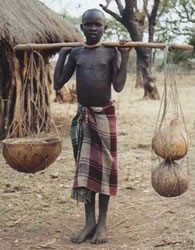The Gumuz people were at one time considered slaves. During the 16th to the 19th centuries, they suffered oppression under the Turko Egyptian Empire, the Mahadist State in Sudan, and the Emperor Menelik in Ethiopia.
The Gumuz language has ten dialects, but those who speak them can understand the others. In Ethiopia, there are two Gumuz subgroups, the Kamash and the Mandura-Dibate. They both speak the Gumuz language. The Gumuz ethnic group lives in Ethiopia and Sudan. The Gumuz of Ethiopia live in the northern and western parts of the country near the Sudan border. Many Gumuz in Ethiopia live in the "bush-savanna" region, an area covered primarily with bamboo and other small trees.
Tributaries in the Gumuz homeland from the Blue Nile provide great potential for irrigation, hydroelectric power, and increased farming in the future. Presently, only a few towns have electricity. While the area is rich in fertile soil, a mere 4.3% of it is cultivated. The presence of gold, copper, zinc, base metal, and marble resources ensures the economic future, provided they find ways to access and process them.
While many animals roam the area, such as lion, cheetah, elephant, antelope, buffalo, warthog, bushbuck, and duiker, there is no hunting reserve or wildlife park. The Kamashi Gumuz people hunt with bows and arrows.
Most breed cattle or farm for a living. They farm their lands together as a clan. When a boy reaches the age of 16, he may work his own farm along with his father's. During the harvest season, they build huts on the fringe of the farmland and live there. They grow millet, sorghum, onion, cotton, tobacco, mango and various spices. The staple food of the Kamashi Gumuz is porridge flavored with a sauce made from leaves, onions, and spices. They supplement their diet with pumpkin seeds, peanuts, fruit, and some insects, and they like to drink coffee. Because they are farmers, trading is important to them, but the lack of roads makes this difficult. They trade most often with the nearby Oromo people. In exchange for their goods, they receive coffee, cloth, soap, salt bars and other items.
The clannish nature of the Kamashi Gumuz keeps their community cohesive, and when there is an infraction, the entire clan involves itself in the punishment. Discipline is meted out for such things as stealing, lying, and wife abuse, keeping drunkenness and idleness to a minimum.
When a daughter is ready for marriage, the clans perform a "sister exchange." That is, the newly married man gives his wife's clan a young woman from his own clan to "replace" the woman he married.
The Kamashi Gumuz are animistic, which means they worship the "spirits" of certain rocks, trees, and animals for good health, good crops, good luck, and protection. Rebba is their "supreme god who knows all." The Gumuz firmly believe that if a woman drinks milk, she will go bald, and if a man eats cabbage, he will be lazy. If a woman eats porridge while she is making it, they believe she or her husband will become ill.
The Kamashi Gumuz have the New Testament but relatively few have heard the gospel. But we are beginning to see a spiritual breakthrough among this group. SIM and other Ethiopian missionaries have begun helping the Kamashi Gumuz to build roads, develop agr
Pray for the Kamashi Gumuz people to have their physical and spiritual needs met.
Pray for the Holy Spirit to move powerfully in their churches, driving them closer to the King of kings.
Pray that soon Kamashi Gumuz disciples will make more disciples.
Scripture Prayers for the Gumuz, Kamashi in Ethiopia.
SIM Serving In Mission
https://visualtribes.com/tribes/gumuz.html
| Profile Source: Joshua Project |











